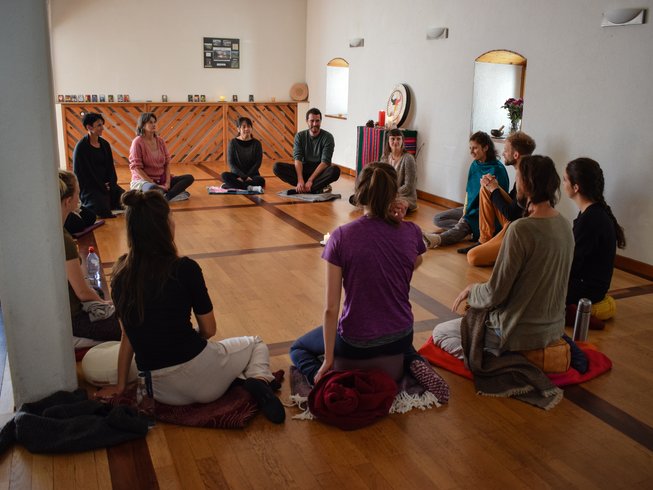
Certainly! Meditation is a practice that has been around for thousands of years and has been used by individuals and cultures around the world to promote physical, mental, and emotional well-being. Over the past few decades, meditation has gained widespread popularity and has been the subject of numerous scientific studies. In this report, we will explore the benefits of meditation in detail.
-
Reduces Stress and Anxiety One of the most well-known benefits of meditation is its ability to reduce stress and anxiety. Studies have shown that regular meditation practice can reduce the levels of cortisol, a hormone that is associated with stress. Meditation can also help reduce symptoms of anxiety and depression by promoting relaxation and reducing the negative thoughts that can contribute to these conditions.
-
Improves Focus and Concentration Meditation can help improve focus and concentration by training the mind to stay in the present moment. Studies have shown that regular meditation practice can increase gray matter in the brain, which is associated with improved cognitive function. Additionally, meditation has been shown to improve working memory, attention, and decision-making abilities.
-
Boosts Immune System Meditation can help boost the immune system by reducing inflammation in the body. Inflammation is a key factor in many chronic diseases, and meditation has been shown to reduce levels of pro-inflammatory cytokines in the body. Additionally, meditation can help improve sleep, which is essential for overall health and immune function.
-
Enhances Self-Awareness and Emotional Well-Being Meditation can help enhance self-awareness and emotional well-being by promoting mindfulness. Mindfulness is the ability to be present in the moment, without judgment or distraction. Regular meditation practice can help individuals develop this skill, which can lead to greater emotional stability, self-awareness, and self-regulation.
-
Improves Cardiovascular Health Meditation can help improve cardiovascular health by reducing blood pressure and promoting healthy blood flow. Studies have shown that regular meditation practice can reduce the risk of heart disease and stroke by improving cholesterol levels and reducing inflammation in the body.
-
Promotes Better Sleep Meditation can help promote better sleep by reducing stress and anxiety, which are common causes of insomnia. Additionally, meditation can help improve the quality of sleep by promoting relaxation and reducing the frequency of waking up during the night.
-
Improves Overall Well-Being Meditation can improve overall well-being by promoting a sense of calm, relaxation, and inner peace. Regular meditation practice can help individuals feel more connected to themselves, others, and the world around them. Additionally, meditation can help individuals develop a greater sense of purpose and meaning in life.
In conclusion, meditation has numerous benefits for physical, mental, and emotional well-being. Regular meditation practice can reduce stress and anxiety, improve focus and concentration, boost the immune system, enhance self-awareness and emotional well-being, improve cardiovascular health, promote better sleep, and improve overall well-being. If you are interested in trying meditation, there are many resources available to help you get started, including apps, guided meditations, and classes.
What is the difference between guided and non-guided meditation ?
The main difference between guided and non-guided meditation is the presence or absence of a teacher or instructor who provides guidance and support during the meditation practice.
Guided meditation involves listening to a teacher or instructor who leads you through the practice. The teacher may use a script or provide verbal cues to help you focus on your breath, body, or a particular visualization. Guided meditation is often used for beginners or those who may find it difficult to maintain focus on their own. It can also be helpful for those who want to try a specific meditation technique, such as loving-kindness or body scan meditation.
Non-guided meditation, also known as silent meditation, involves practicing on your own without any external guidance. This type of meditation typically involves sitting in silence and focusing on your breath or a particular sensation in the body. Non-guided meditation can be more challenging for beginners, as it requires greater self-discipline and focus. However, it can also be more beneficial in developing a deeper sense of self-awareness and introspection.
Both guided and non-guided meditation have their own benefits and drawbacks. Guided meditation can be helpful in providing structure, support, and guidance, while non-guided meditation can be more flexible and allow for greater introspection and self-discovery. Ultimately, the choice between guided and non-guided meditation depends on your personal preference, experience, and goals for meditation practice.

Should one use music for meditation ?
Whether or not to use music for meditation is a personal choice that can vary depending on the individual and their goals for meditation. Here are some things to consider when deciding whether or not to use music during meditation:
-
Personal preference: Some people find that music helps them to relax and focus during meditation, while others prefer the silence and find music distracting. It's important to try both approaches and see which one works best for you.
-
Meditation style: Some meditation styles, such as mantra or chakra meditation, use specific sounds or vibrations as a focal point. In these cases, music or chanting can be an integral part of the practice.
-
Purpose of meditation: If you are meditating for relaxation or stress reduction, soothing music may help to create a calming atmosphere. However, if you are meditating for increased awareness or self-discovery, silence may be more conducive to this type of practice.
-
Type of music: If you choose to use music during meditation, it's important to select music that is calming, soothing, and free from distractions such as lyrics or sudden changes in tempo. Ambient or instrumental music is often a good choice for meditation.
Ultimately, the decision of whether or not to use music during meditation depends on personal preference and the type of practice you are engaged in. Experiment with different approaches and find what works best for you.
What is the best place to meditate ?
The best place to meditate is one that is quiet, comfortable, and free from distractions. Here are some factors to consider when choosing a location for meditation:
-
Quiet: Choose a location where you won't be disturbed by external noises, such as traffic or loud conversations. This can help you to maintain focus and achieve a deeper state of relaxation.
-
Comfortable: Select a location where you can sit comfortably for an extended period of time. This might be a cushion or a chair with good back support. Avoid sitting on a bed or couch, as these may make you too comfortable and increase the likelihood of falling asleep.
-
Clean and uncluttered: A clean and uncluttered space can help to promote a sense of calm and serenity. Make sure the area is free from any clutter or distractions, such as electronic devices or papers.
-
Temperature: The temperature of the room can affect your ability to relax and focus. Choose a location with a comfortable temperature, and dress in layers if necessary.
-
Lighting: Soft, natural lighting can help to create a relaxing atmosphere. Avoid bright lights or harsh lighting that can be distracting or cause eye strain.
Some examples of good places to meditate include a quiet room in your home, a peaceful outdoor space, or a dedicated meditation room or studio. Ultimately, the best place to meditate is one that feels comfortable and allows you to fully engage in your practice.

